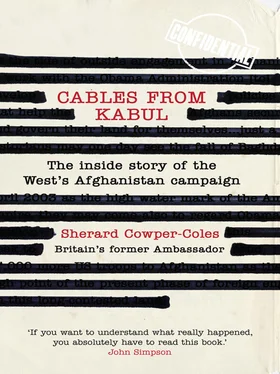But what was really striking was the range of institutional cultures represented on that Residence lawn. Only a small minority were ‘straight’ diplomats. Of course, there were spies, and members of the home civil service, from departments as different as HM Revenue and Customs (advising the Afghans on raising their tax take), the Ministry of Justice (which had sent out six prison officers), the Crown Prosecution Service (including a Rumpole-esque representative of the English Bar), the Cabinet Office (a fast-streamer in search of excitement) and of course the Department for International Development (scores of enthusiastic development experts, known affectionately to the military as tree-huggers). But there were soldiers and sailors and Marines and airmen in desert uniform too, and British policemen, from the Met and the Northumbria Police, and customs men and women, and officers from the Serious Organised Crime Agency, technicians of every kind, and even builders from Britain, refurbishing the Embassy’s secure zone. And, everywhere, the ubiquitous Men In Beards – some genuine Special Forces operatives, but mostly just pretending. Few of the home civil servants had ever worked in an embassy or dealt with the Diplomatic Service, let alone operated in an environment as difficult and dangerous as Afghanistan.
Turning such a mixed bag of officers, officials and civilian experts into a real team would be a never-ending challenge, especially as the working pattern for most civilian staff of six weeks on, two weeks off, with six-or twelve-month tours, meant that the turnover was unending. Every Thursday night (Friday was our only full day off) somebody would be holding leaving drinks of one kind or another, even if only to celebrate surviving another six weeks ‘in theatre’. Sometimes, in despair, learning that some member of the team had just disappeared ‘on breather’, I would feel I was running a railway station rather than an embassy.
Mostly, however, it was more like being the headmaster of a run-down but generally happy and successful prep school, or the governor of an open prison whose inmates were repaying their debt to society handsomely and many times over. None of us doubted that, compared with our rivals – the overlarge and persistently unhappy American Embassy, the Canadians, the French, the Germans, the Danes and the Dutch, plus a UN mission almost always at war with itself – we were by far the most effective diplomatic operation in town. We knew more, did more, worked harder and had more fun than any of the other Embassies.
But, in May 2007, all that was still before me. In the gathering gloom, and with a distinct nip in the air encouraging brevity (Kabul is nearly 6,000 feet above sea level), Michael chinked on his glass, welcomed the new ‘HMA’ and asked me to ‘say a few words’. I can’t remember now exactly what I said then, or at meetings the next day for the British staff and then at a town-hall meeting for all the several hundred Embassy employees, of many nationalities. But I know that the messages I wanted to get across were as follows. First, and most important, we needed to be honest in our assessments of what was happening, and of what would and wouldn’t work. Both the intervention in Iraq and the Afghan project had in my view been bedevilled by too much wishful thinking, an excess of over-eager-to-please officers and officials telling their masters, locally and back in capitals, what they thought those bosses wanted to hear. Second, I wanted us to work to high standards, everyone delivering to the best of his or her ability. Sloppy drafting, for example, meant sloppy thinking. Third, I wanted people to behave as though they were professionals: I had no objection, for instance, to casual dress, but visitors to the British Embassy needed to come away thinking we were an operation they could trust. ‘More Goldman Sachs on dress-down Friday than Glastonbury’ was the message I tried to convey. And, finally, I wanted us to have fun. We were in a tough place, doing a tough job. We needed to be able to chill out – within the proper boundaries.
How all this went down I don’t know. But I do know that, in general, and despite the inevitable ups and downs, we were able over the next couple of years to build a team that really was a team, in the best sense of the term. It was much more than just the comradeship of adversity. It was because we all believed we had a real and important job to do, and we wanted to give it our best shot.
The next morning I started to get to grips with the Embassy’s physical and human geography. The main offices were in a squat block of flats leased from the Bulgarian Embassy. The building was supposedly earthquake-proof, festooned with satellite dishes and wireless aerials, and still infested with builders brought out from London to upgrade it to match the Afghan ambitions of Her Majesty’s Government (HMG). Most staff lived in converted cargo containers, or ‘pods’, in an area of the compound known, inevitably, as Poddington. But a growing proportion, including most of the DFID team, were transferring to a range of expensively leased and refurbished villas. Staff there lived student-style, sharing sitting rooms and kitchens. There was a canteen, serving subsidised food of varying quality from seven till seven, a small shop, a bar (of which more later), a gym and an asphalt sports pitch. A swimming pool was to come later, and in fits and starts. Almost all travel off this compound had to be authorised and, depending on the security situation, protected in varying degrees. About a hundred private guards from Britain, almost all ex-forces, plus over 300 Gurkhas, secured our operations, at a cost of tens of millions of pounds each year.
I took my first morning meeting, and my first weekly town-hall meeting. I ate my first canteen lunch – I would try always to lunch there when I did not have an official engagement – and drank my first drink at the bar. The officer in charge of my eight-man team of bodyguards from the Royal Military Police briefed me on the daily routine. And then it was down to business. At one of my first briefings, I told the Embassy’s senior intelligence representative that my top priority would be building a relationship with President Karzai. ‘Oh no it won’t,’ he retorted in the blunt northern fashion that I was to come to value. ‘Your key relationship will be with the American Ambassador. He matters most to us.’ In this he was not implying that my job wasn’t to influence President Karzai and his Government, but that I would have a much better chance of doing so if I worked with the Ambassador of the predominant foreign power in Afghanistan.
So it was that on my second night in Kabul I found myself in the heavily fortified American Embassy compound, riding the lift up to the penthouse apartment of my new US colleague, William Wood. Bill was to become a valued colleague and a good friend. A highly intelligent and very senior member of the US Foreign Service, he had been personally selected by the Secretary of State, Condoleezza Rice, for this key job, having pleased the Bush Administration with his performance as ambassador in Bogotá. In effect, he was being transferred from the War on Drugs to the War on Terror. Bill was utterly professional and unfailingly loyal, despite often being saddled with impossible instructions from Washington. He never did more than hint at the doubts I suspected he had about some aspects of the Bush Administration’s approach to Afghanistan. Behind a larger-than-life exterior, firing off one-liners and enjoying the occasional cigarette and Scotch on the rocks, lay a man of culture and discrimination, whose real loves were history and English literature, especially P. G. Wodehouse.
Bill, who had arrived only a few weeks before me, would often refer, somewhat nostalgically, to his Colombian experience, particularly of aerial spraying of the coca crop, which he believed to have been a huge success there. This had already led the Kabul diplomatic corps to christen him ‘Chemical Bill’.
Читать дальше












